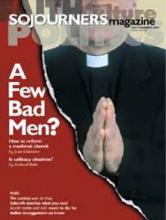Come to the Table
Invite your friends, pass the cookies, and dig into Sojourners. Table Talk discussion guides provide a bi-weekly gathering place for communities to discuss issues of faith, politics, and culture--local and global. Table Talk offers a smorgasbord of questions (enough for four sessions, if you want to arrange it that way), as well as resources for further study and suggestions for action. You bring dessert.
Download in
Session I. The Perils of Power
The Faith Will Survive (p. 20)
Seeing With One Eye (p. 22)
Catholic Scandal, Ecumenical Solution (p. 18)
Theres nothing wrong with Jesus and the sacraments, said the people of Ireland after a pedophilia scandal rocked the Catholic Church. Whats wrong, they said, is the institution itself. Built on silence, exclusion, and domination, the system that rules the church is crumbling and unless things change, Joan Chittister writes, it will be the authorities who stand to lose. Rose Marie Berger offers a blueprint for clergy accountability that begins in our own congregations and denominations.
Read the Full Article
